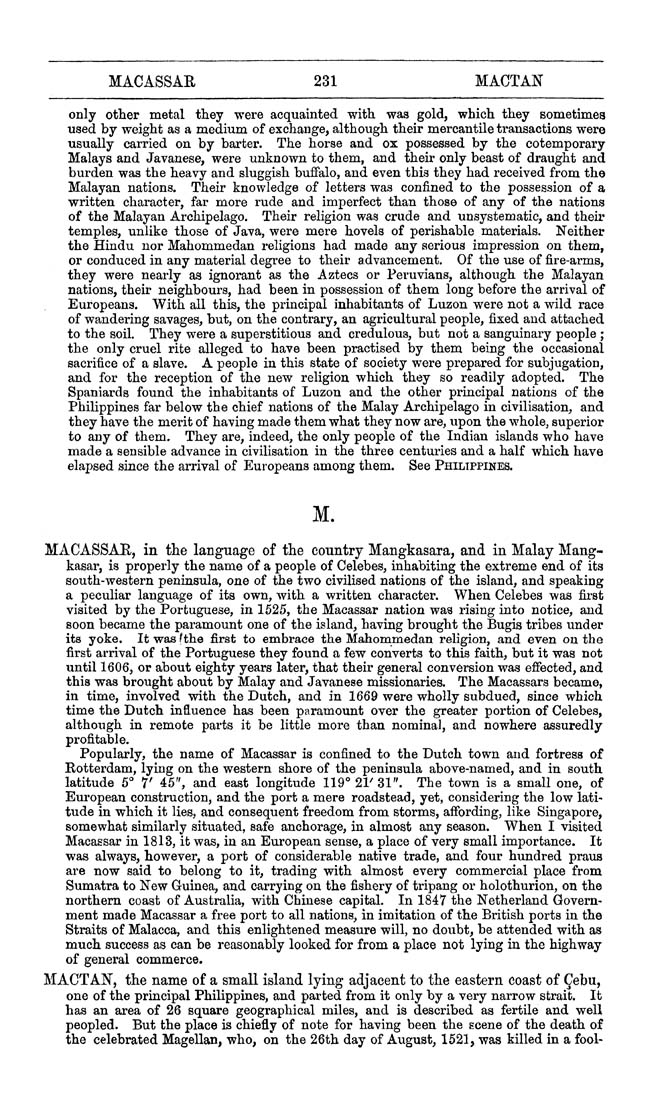MACASSAR 231 MACTAN
only other metal they were acquainted with was gold, which they sometimes
used by weight as a medium of exchange, although their mercantile transactions were
usually carried on by barter. The horse and ox possessed by the cotemporary
Malays and Javanese, were unknown to them, and their only beast of draught and
burden was the heavy and sluggish buffalo, and even this they had received from the
Malayan nations. Their knowledge of letters was confined to the possession of a
written character, far more rude and imperfect than those of any of the nations
of the Malayan Archipelago. Their religion was crude and unsystematic, and their
temples, unlike those of Java, were mere hovels of perishable materials. Neither
the Hindu nor Mahommedan religions had made any serious impression on them,
or conduced in any material degree to their advancement. Of the use of fire-arms,
they were nearly as ignorant as the Aztecs or Peruvians, although the Malayan
nations, their neighbours, had been in possession of them long before the arrival of
Europeans. With all this, the principal inhabitants of Luzon were not a wild race
of wandering savages, but, on the contrary, an agricultural people, fixed and attached
to the soil. They were a superstitious and credulous, but not a sanguinary people ;
the only cruel rite alleged to have been practised by them being the occasional
sacrifice of a slave. A people in this state of society were prepared for subjugation,
and for the reception of the new religion which they so readily adopted. The
Spaniards found the inhabitants of Luzon and the other principal nations of the
Philippines far below the chief nations of the Malay Archipelago in civilisation, and
they have the merit of having made them what they now are, upon the whole, superior
to any of them. They are, indeed, the only people of the Indian islands who have
made a sensible advance in civilisation in the three centuries and a half which have
elapsed since the arrival of Europeans among them. See Philippines.
M.
MACASSAR, in the language of the country Mangkasara, and in Malay Mang-
kasar, is properly the name of a people of Celebes, inhabiting the extreme end of its
south-western peninsula, one of the two civilised nations of the island, and speaking
a peculiar language of its own, with a written character. When Celebes was first
visited by the Portuguese, in 1525, the Macassar nation was rising into notice, and
soon became the paramount one of the island, having brought the Bugis tribes under
its yoke. It was fthe first to embrace the Mahommedan religion, and even on the
first arrival of the Portuguese they found a few converts to this faith, but it was not
until 1606, or about eighty years later, that their general conversion was effected, and
this was brought about by Malay and Javanese missionaries. The Macassars became,
in time, involved with the Dutch, and in 1669 were wholly subdued, since which
time the Dutch influence has been paramount over the greater portion of Celebes,
although in remote parts it be little more than nominal, and nowhere assuredly
profitable.
Popularly, the name of Macassar is confined to the Dutch town and fortress of
Rotterdam, lying on the western shore of the peninsula above-named, and in south
latitude 5° 7' 45", and east longitude 119° 21' 31". The town is a small one, of
European construction, and the port a mere roadstead, yet, considering the low lati¬
tude in which it lies, and consequent freedom from storms, affording, like Singapore,
somewhat similarly situated, safe anchorage, in almost any season. When I visited
Macassar in 1813, it was, in an European sense, a place of very small importance. It
was always, however, a port of considerable native trade, and four hundred praus
are now said to belong to it, trading with almost every commercial place from
Sumatra to New Guinea, and carrying on the fishery of tripang or holothurion, on the
northern coast of Australia, with Chinese capital. In 1847 the Netherland Govern¬
ment made Macassar a free port to all nations, in imitation of the British ports in the
Straits of Malacca, and this enlightened measure will, no doubt, be attended with as
much success as can be reasonably looked for from a place not lying in the highway
of general commerce.
MACTAN, the name of a small island lying adjacent to the eastern coast of ^ebu,
one of the principal Philippines, and parted from it only by a very narrow strait. It
has an area of 26 square geographical miles, and is described as fertile and well
peopled. But the place is chiefly of note for having been the scene of the death of
the celebrated Magellan, who, on the 26th day of August, 1521, was killed in a fool-
|








